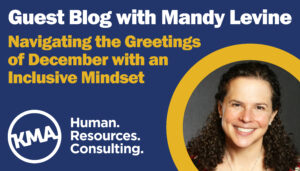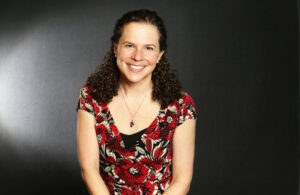Guest blog by Mandy Levine, of Mandy Levine Consulting
 Conversations about religion are rife with opportunities for misunderstanding, discomfort, and sometimes conflict. Add the workplace to that delicate mix and you can imagine why the month of December can be challenging for many employees to navigate. Today I’m dipping my toe in the churning waters of holiday greetings. Specifically, my thoughts on how we can acknowledge other people’s holidays in a way that is both inclusive and individualized.
Conversations about religion are rife with opportunities for misunderstanding, discomfort, and sometimes conflict. Add the workplace to that delicate mix and you can imagine why the month of December can be challenging for many employees to navigate. Today I’m dipping my toe in the churning waters of holiday greetings. Specifically, my thoughts on how we can acknowledge other people’s holidays in a way that is both inclusive and individualized.
December can be a lonely month for some of your colleagues and friends
For your employees and friends who do not celebrate Christmas (such as Jewish, Muslim, and atheist friends), December can be a long and lonely month. As soon as the last bite of Thanksgiving pie is gobbled up, the Christmas decorations and jingles are ubiquitous and, for those of us who do not celebrate Christmas, a constant reminder of our difference. I in no way begrudge anyone their celebration of Christmas – no Grinch here! – but I’m rather pointing out that the month of December, unlike any other, is the month of feeling other for many of us. Growing up Jewish and now settled as a Jewish adult in Maine, I have plenty of firsthand experience navigating the fraught space of being the only one (or one of a few) of a particular religion. (My favorite children’s book on this topic is The Only One Club by Jane Naliboff). Estimates of the number of Jews in Maine vary but the number I’ve found cited the most is about 0.9% of Maine’s population, compared to approximately 2.4% of the overall U.S. adult population..
This feeling of otherness came to a head for me recently during a conversation with a salesperson in front of my two daughters, ages 10 and 14. I was purchasing a wax scent burner for my house and the available designs for the wax burner were almost entirely Christmas-y (Santa Claus, reindeer, Christmas trees, etc.). I asked the salesperson if she had any designs that were not Christmas-themed and her seemingly genuine question in response was, “Why?” When I explained that I am Jewish and do not celebrate Christmas, she turned to my children and said, “I’m so sorry. That’s so sad.” Both of my daughters immediately looked at me in confusion, eyes wide in shock. Mustering up my composure, I responded more jovially than I felt, in part to put on a brave face for my kids, “That’s okay, don’t be sad for us! We’re really happy and enjoy our religion and holidays too.” In a chipper tone, the woman proceeded to say, “Well, Hanukkah and Christmas are really the same right?” You could have heard a pin drop.
Hanukkah is not the same as Christmas, and that’s okay. Yes, they both typically occur in December (Judaism, like Islam, uses a lunar calendar and so the dates of Jewish holidays, like Muslim holidays, vary every year) but that’s really where the similarities end. I suspect that folks may try to equate Hanukkah as the Jewish version of Christmas – they both involve the exchange of gifts, right? – because it makes them feel more comfortable. Our differences, religious or otherwise, can make us feel ill at ease. Thanks to the powerful similarity/affinity bias, we feel more comfortable interacting with people we perceive to be similar to us. If my religion is a bit unfamiliar to you, I’ll liken your traditions to mine and we’ll all be good [insert touch of sarcasm here]. I am not assigning any ill will to the woman who expressed that she felt badly for my kids for not celebrating Christmas. I don’t believe that she meant to ostracize my family in any way. That said, the actual impact of her words was to remind us of our otherness. That subtle, pin-prickly implicit messaging of, “You don’t belong there.” Afterwards, one of my children said, “Momma, I don’t think she has ever met a Jewish person before!” I suspect my daughter was right. I tried to use the conversation as an opportunity to demystify Judaism just a teeny bit for the woman, and to have a candid conversation with my daughters about the disconnect between the likely positive intent of the salesperson’s comments and the actual impact of her words.
Inclusive ways to greet each other
I think it’s wonderful to greet a friend, family member, or colleague who you know celebrates Christmas with a warm, heartfelt “Merry Christmas.” I routinely wish my Christian friends a hearty “Merry Christmas” and love to give them Christmas cards and presents. I also have a tremendous appreciation for Christmas carols, ugly sweater contests, and building gingerbread houses from Trader Joe’s kits.
When I am greeted with a hearty “Merry Christmas,” which happens countless times in December, I genuinely appreciate that the speaker is attempting to convey good cheer. But a default greeting of wishing others “Merry Christmas” is a tiny but real reminder of my (and many others’) feeling that they do not belong. Many of your Jewish friends and colleagues are likely feeling very shaken right now, with antisemitic incidents in the U.S. reaching an all-time high in 2021. Making a small effort to use a more individualized or even a more generalized holiday greeting might mean the world to them. A dear Muslim friend shared that he routinely feels left out when his employers offer “holiday” meals in December while ignoring significant holidays in the Islamic religion, like Eid, the end of Ramadan.
All of which gets us to the heart of the question – how do we greet each other during the month of December? On the one hand, we want to express heartfelt good wishes to those we meet and those we care about. On the other hand, we presumably don’t want to use greetings that inadvertently ostracize someone.
Delicately walking across that religious greeting tight rope, here’s my recommended cheat sheet:
- If you know the holiday that someone celebrates, provide them that heartfelt and individualized greeting like “Merry Christmas!” or “Happy Hanukkah!”
- If you do not know what holidays (if any) someone celebrates, such as greeting a colleague or passerby, simply wishing them “happy holidays” is a much more inclusive and far-reaching term that encompasses multiple religious holidays.
The more generic “happy holidays” greeting has been painted as an attack on Christianity and an attempt to remove religion from the holiday. My intent is not to attack religion or remove any religious elements from Christmas – I’m delighted to wish you Merry Christmas if I know you celebrate it – but rather I encourage folks not to assume that everyone celebrates Christmas in the first instance.
The “happy holidays” greeting is admittedly not perfectly inclusive and might leave out folks whose religions do not observe any holidays during December, or those who do not celebrate any religion. The pursuit of perfection in this space (and I’d wager all spaces) is a losing game. But using the “happy holidays” phrase when we don’t know someone’s religion, albeit imperfect, is still a step in the right direction of acknowledging and honoring our differences while simultaneously expressing good cheer. And isn’t that what this month is all about? Taking small and intentional steps towards greater understanding, accommodation of, and ideally celebration of our differences.
Wishing everyone a season of light, good health, and good cheer!
Postscript: if you’re looking for great guidance on how to navigate different religious holidays in the workplace or in our schools, some recommended resources are the following:
- Are Non-Christian Employees Represented in Your Holiday Policies? (hbr.org)
- December Dilemma: Teaching About Religious Holidays | Religion in Public Schools | ADL
- 6 Tips for Navigating Your Religious Needs at Work | The Muse or
How to Celebrate Holidays (Inclusively) at Work – ChartHop – All your people data in one place
About Mandy
 Mandy Levine is the owner of Mandy Levine Consulting, facilitating interactive classes and consulting for organizations large and small on myriad diversity, equity, and inclusion (DEI) related topics. Mandy is also licensed in the State of Maine as a Professional Investigator and discreetly and efficiently conducts workplace investigations into allegations of harassment and discrimination.
Mandy Levine is the owner of Mandy Levine Consulting, facilitating interactive classes and consulting for organizations large and small on myriad diversity, equity, and inclusion (DEI) related topics. Mandy is also licensed in the State of Maine as a Professional Investigator and discreetly and efficiently conducts workplace investigations into allegations of harassment and discrimination.
Mandy received her Bachelor of Arts from Middlebury College in Vermont and her J.D. from Boston College Law School. Before starting her own consulting business in 2020, Mandy spent several years practicing employment law in Boston and Burlington, Vermont. She then transitioned to civil rights work, advocating on behalf of victims of hate crimes and hate incidents as the Assistant Director of Civil Rights at the New England regional office of the Anti-Defamation League in Boston. Upon returning home to Maine after nearly 20 years away, Mandy spent four years as an HR Business Partner at Maine Medical Center and more recently worked at the City of Portland, spearheading DEI initiatives for the city’s staff. Mandy is the co-chair of the Diversity Hiring Coalition of Maine, the 2019 recipient of the Holocaust and Human Right Center of Maine’s Distinguished Service Award, the 2020 recipient of the Jewish Community Alliance of Southern Maine’s Richard D. Aronson Young Leadership Award, Mandy Levine Guest Blog and one of ten 2022 honorees of Greenlight Maine’s Elevating Voices.
Mandy grew up in Auburn, Maine and now lives outside of Portland, Maine with her partner Mark, two kids, two step kids, two cats, and one quarantine bunny.
